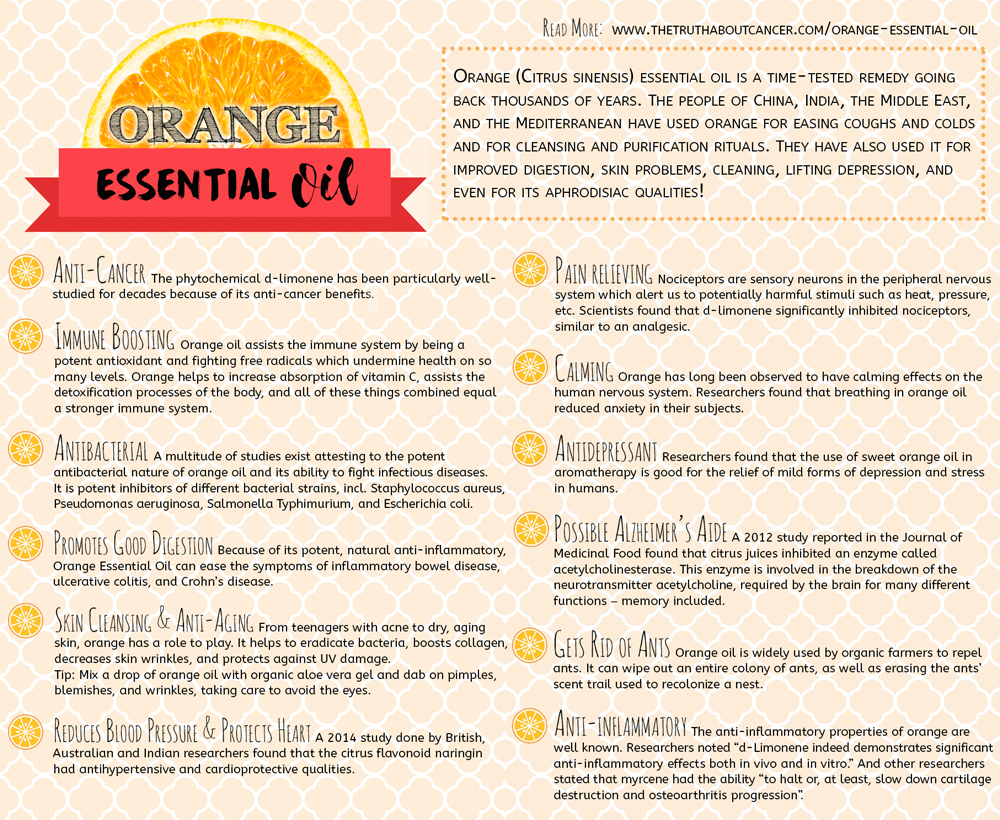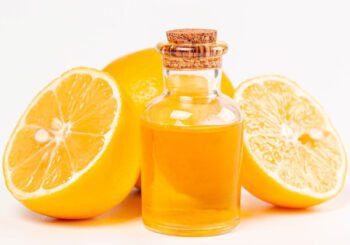By Ty Bollinger
Guest Writer for Wake Up World
There are few things better than the aroma of someone peeling an orange. That zesty, fresh, tangy scent makes your mouth water and sharpens your senses. Such is the power of aromatherapy! Orange is well known for its mood lifting, immune stimulating, antibacterial, and cleansing properties. But orange essential oil is amazing for so much more!
[pro_ad_display_adzone id=”110028″]
Orange (Citrus sinensis) essential oil is a time-tested remedy going back thousands of years. The people of China, India, the Middle East, and the Mediterranean have used orange for easing coughs and colds and for cleansing and purification rituals. They have also used it for improved digestion, skin problems, cleaning, lifting depression, and even for its aphrodisiac qualities! It is said that Christopher Columbus carried orange seeds with him on his long journey to the Americas. The Spanish explorer Ponce de Leon is said to have introduced oranges (and cattle) to Florida in 1513.
What’s in Orange Essential Oil?
Orange oil is mechanically cold pressed from the rind of the fruit. Unlike other citrus fruits, oranges do not continue to ripen after picking. The fruit must be harvested at precisely the right time to obtain maximum essential oil yield.
The phytochemical (all-natural plant chemical) content of orange essential oil is rather impressive. One Egyptian study found over 200 phytochemicals in the peel, leaves, and flowers of Citrus sinensis. The most abundant phytochemical in orange is d-limonene, at between 80-96%. D-limonene has been widely studied for its applications for health, and especially for cancer. Orange also contains myrcene, alpha-pinene, citronellal, geranial, linalool, and neral.
Modern uses for orange essential oil abound. The vast majority of orange oil is used by the food industry where it is used in soft drinks, juices, and candy. The skin care industry has discovered its anti-aging benefits and use as a natural preservative. Orange oil is also widely used in cleaning products and it has natural antiseptic properties.
The Research On Health Benefits of Orange Essential Oil
Some of the research listed here is on actual orange essential oil. Some of it, however, is on orange juice. It’s important to remember that what is contained in the juice is also contained in the oil ? only even more highly concentrated!
#1 – Anti-Cancer
Hundreds of research studies are being done on the compounds in orange which confirm its cancer-fighting potential. The phytochemical d-limonene has been particularly well studied for decades because of its anti-cancer benefits. A 1984 study on rats fed a high dose of d-limonene found that they had a 72% reduction in mammary tumors. Since that 1984 study, over three decades worth of research has been carried out indicating d-limonene is effective against several lines of breast cancer cells.
A 2014 American study involving 43 women with operable breast cancer tumors examined the role of dietary d-limonene prior to surgical removal of the tumors. The women were given two grams of d-limonene daily for two to six weeks prior to surgery. Researchers found that d-limonene had a wide range of anticancer action.
An American study reported in 2009 in the Journal of Molecular Nutrition and Food Research found that the phytochemicals contained in orange peel inhibited the growth of human lung cancer cells.
D-limonene has been found to inhibit the growth of pancreatic cancer cells. It is also assisting cancer researchers in some rather surprising ways. A study reported in 2015 in Molecular Pharmacology by American scientists examined the effectiveness of gene therapy in overcoming pancreatic cancer ? one of the deadliest forms of cancer. They were investigating MDA-7/IL-24, a tumor suppressor, which when introduced into cancer cells fosters an anticancer immune response. The scientists were encountering trouble with the delivery system and turned to d-limonene for help. It was found to be an effective and non-toxic delivery strategy.
#2 – Anti-Fungal
A 2010 Indian study found the essential oil from Citrus sinensis to be a potent and non-toxic anti-fungal, completely inhibiting aflatoxin B1, a poisonous and cancer-causing chemical caused by mold.
A research study reported in 1996 investigated ten different essential oils against 12 fungal strains. Orange was one of the oils tested. Researchers found orange to be effective against all 12 fungal strains.
#3 – Immune Boosting
Orange oil assists the immune system by being a potent antioxidant and fighting free radicals which undermine health on so many levels. Orange helps to increase absorption of vitamin C, assists the detoxification processes of the body, and all of these things combined equal a stronger immune system.
Indian research reported in 2003 found that limonene fed to mice increased their white blood cell count (an important part of the immune system).
A small human study reported by Japanese researchers in 2008 found that a three-day trip to the forest had profound effects on the immune systems of the test subjects. They walked for two to four hours per day and breathed in alpha-pinene, beta-pinene, and limonene, all phytochemicals present in conifer forests ? but also in orange oil. This activity increased the number and action of natural killer cells and levels of anti-cancer proteins.
Natural killer cells are a vital part of a healthy immune system. The research showed that the effects of the forest walking lasted in the study subjects up to seven days after the trip. This research easily demonstrates that just breathing in an essential oil can have substantial positive effects on the immune system.
#4 – Antibacterial
A multitude of studies exist attesting to the potent antibacterial nature of orange oil and its ability to fight infectious diseases.
In 1996, Indian researchers investigated the effects of ten essential oils (orange among them) against 22 strains of bacteria, both gram-positive and gram-negative. Orange essential oil was effective against all 22 strains of bacteria.
But what about the newer, nastier, antibiotic-resistant bugs? A 2016 American study investigating the effects of orange oil on bovine mastitis caused by Staphylococcus Aureus (golden staph) found that linalool from orange oil effectively inhibited this strain as well. A 2015 Pakistani study on the phytochemicals derived from the peel of Citrus sinensis found them to be potent inhibitors of 11 different bacterial strains, including Staphylococcus aureus, Pseudomonas aeruginosa, Salmonella Typhimurium, and Escherichia coli.
#5 – Promotes Good Digestion
Orange essential oil is helpful for digestion in several different ways. Because it is a potent, natural anti-inflammatory, it can ease the symptoms of inflammatory bowel disease, ulcerative colitis, and Crohn’s disease. A 2016 study done jointly by Pakistani and Saudi researchers found orange juice to have anti-inflammatory and other beneficial effects in rats with colitis.
Orange also has muscle relaxing qualities. This enhances circulation, promotes better digestion, and eases constipation. In addition, orange acts as a mild diuretic, increasing the production of urine and helping with detoxification. By its action in stimulating the lymphatic system, orange helps to draw toxins out of the body, and this also promotes better digestion. Tip: Combine orange essential oil with peppermint or spearmint essential oil and a carrier oil and rub it over the stomach to soothe an upset tummy.
#6 – Skin Cleansing and Anti-Aging
Because orange oil is such a wonderful anti-inflammatory, antioxidant, and antibacterial, it is especially good for the skin. From teenagers with acne to dry, aging skin, orange has a role to play. It helps to eradicate bacteria, boosts collagen, decreases skin wrinkles, and protects against UV damage.
A 2016 Japanese study examined polymethoxyflavones (PMFs) ? extracted from orange peels ? and their anti-aging effects. They discovered that PMFs suppress the expression of particular enzymes in the skin that lead to skin wrinkling when exposed to UVB light. Another Japanese study reported in 2014 that PMFs also had anti-inflammatory activity. The researchers stated PMFs from orange could provide useful protection against, or alleviation of, skin damage caused by ultraviolet light. In addition, a 2014 French study on mice found that d-limonene and perillyl alcohol (a by-product of d-limonene) had remarkable wound healing properties, improved tissue regeneration, and had anti-inflammatory effects.
Tip: Mix a drop of orange oil with organic aloe vera gel and dab on pimples, blemishes, and wrinkles, taking care to avoid the eyes.
# 7 – Reduces Blood Pressure, Protects Heart
Japanese researchers in 1986 examined the hypotensive (blood pressure reducing) properties of flavonoids extracted from orange peels. The researchers discovered that these compounds (also present in orange oil) did indeed have a blood pressure reducing effect on the rats they studied.
A 2014 study done by British, Australian and Indian researchers found that the citrus flavonoid naringin had antihypertensive and cardioprotective qualities. Indeed, a 2016 Pakistani study on rats fed a high cholesterol diet as well as orange and grapefruit juice for eight weeks showed interesting results. The rats getting the citrus juice had a significant reduction in triglyceride and cholesterol levels.
An earlier American study released in 2010 found that people having orange juice with high fat, high carbohydrate meals neutralized the pro-inflammatory effects of the meal.
#8 – Anti-inflammatory
The anti-inflammatory properties of orange are well known. The research thus far has mainly been on animals, but we are beginning to see more human trials coming through. One 2015 French study on rats with colitis found d-limonene to have anti-inflammatory properties and worked as well as ibuprofen. The same study also investigated the effects of d-limonene on older people. Researchers noted “d-Limonene indeed demonstrates significant anti-inflammatory effects both in vivo and in vitro.”
A 2015 study by Portuguese researchers found that myrcene (another component of orange oil) has anti-inflammatory and other benefits in osteoarthritis. Researchers stated myrcene had the ability “to halt or, at least, slow down cartilage destruction and osteoarthritis progression.”
#9 – Pain relieving
In 2007, Brazilian researchers examined the role of d-limonene for pain relief. Nociceptors are sensory neurons in the peripheral nervous system which alert us to potentially harmful stimuli such as heat, pressure, etc. The scientists found that d-limonene significantly inhibited nociceptors, similar to an analgesic. Japanese scientists in 2016 made similar findings, noting that d-limonene had inhibitory effects on nociceptors when administered systemically.
#10 – Calming
Orange has long been observed to have calming effects on the human nervous system. We now have research to reinforce ancient knowledge. Research published in 2013 in Advanced Biomedical Research on 30 children, aged 6-9, about to undergo two dental procedures had interesting results. Each child was given aromatherapy treatments with orange in one session and no aromatherapy during the second visit. They found that the children had reduced cortisol levels and pulse rates when receiving the aromatherapy, and this led to decreased anxiety. Subsequent research released in 2014 on 56 adults had similar findings. The adults were about to undergo dental surgery and were experiencing moderate to high levels of anxiety. They found that breathing in orange reduced anxiety in these subjects.
#11 – Antidepressant
A small Japanese study reported in 1995 on 12 depressed human patients had impressive results. The researchers noted the citrus aromatherapy was quite effective, and stated “…the doses of antidepressants necessary for the treatment of depression could be markedly reduced. The treatment with citrus fragrance normalized neuroendocrine hormone levels and immune function and was rather more effective than antidepressants.”
A 2005 study done by Thai and Austrian researchers on 24 healthy volunteers found orange oil to be stimulating to the autonomic nervous system. The scientists in this study stated “These findings furnish scientific proof for the use of the sweet orange oil in aromatherapy for the relief of mild forms of depression and stress in humans.”
#12 – Possible Alzheimer’s Aide
A 2009 Japanese study found that using orange (and other essential oils) may aid in improving cognitive function in Alzheimer’s patients.
A 2012 study reported in the Journal of Medicinal Food found that citrus juices inhibited an enzyme called acetylcholinesterase. This enzyme is involved in the breakdown of the neurotransmitter acetylcholine, required by the brain for many different functions ? memory included. Scientists have observed that inhibiting the enzyme that breaks down acetylcholine helps alleviate some of the symptoms of Alzheimer’s patients. Several drugs created for Alzheimer’s patients do exactly this.
#13 – Gets Rid of Ants!
This isn’t a health benefit per se (unless ants in your house are driving you crazy!), but a use that could come in handy… Orange oil is widely used by organic farmers to repel ants. It can wipe out an entire colony of ants, as well as erasing the ants’ scent trail used to recolonize a nest. Orange oil is a great, non-toxic method of pest control.

Precautions When Using Orange Oil
While researching orange essential oil on the Internet, you will no doubt come across information about photosensitivity and citrus oils. Not all citrus oils cause photosensitivity, however, and Citrus sinensis is one that is safe to use prior to sun exposure ? particularly if it has been diluted with a good quality carrier oil.
With regard to dilution, it is a good idea to use a carrier oil (such as organic almond, olive, coconut, hemp, or macadamia) when applying essential oils to the skin. Combine 1-2 drops of essential oil with 1-3 teaspoons of a carrier oil prior to applying to skin.
When using essential oils for health improvement, always use a high quality essential oil. It’s important to know where your essential oils come from. For instance, has the rind of the fruit been sprayed with pesticides? Are the trees organically grown? Does the company use proper distillation methods (i.e. no chemical solvents)? If the company does not share this information with you about their oils, it is best to avoid them.
Looking for more information on how to use essential oils? Check out the articles below!
- 12 Ways to Use Essential Oils for Healing & Health
- Essential Oil Dos and Dont’s (with Dr. Eric Zielinski)
- Touch, Smell, Taste: 3 Powerful Ways to Use Essential Oils
Sources and References:
- Anti-inflammatory, Insecticidal and Antimicrobial Activities and Chemical Composition of the Essential Oils of Different Plant Organs from Navel Orange (Citrus sinensis (L.) Osbeck Var. Malesy) Grown in Egypt
- Inhibition of DMBA-induced Mammary Cancer by the Monoterpene d-limonene
- Plasma Metabolomic Profiles of Breast Cancer Patients after Short-term Limonene Intervention
- Monodemethylated Polymethoxyflavones from Sweet Orange (Citrus Sinensis) Peel Inhibit Growth of Human Lung Cancer Cells by Apoptosis
- Reversing Translational Suppression and Induction of Toxicity in Pancreatic Cancer Cells Using a Chemoprevention Gene Therapy Approach
- Chemical Profile, Antifungal, Antiaflatoxigenic and Antioxidant Activity of Citrus Maxima Burm. And Citrus Sinensis (L.) Osbeck Essential Oils and Their Cyclic Monoterpene, DL-limonene
- Antibacterial and Antifungal Activity of Ten Essential Oils in Vitro
- Immunomodulatory Activity of Naturally Occurring Monoterpenes Carvone, Limonene, and Perillic Acid
- Visiting a Forest, but Not a City, Increases Human Natural Killer Activity and Expression of Anti-cancer Proteins
- Major Components of Orange Oil Inhibit Staphylococcus Aureus Growth and Biofilm Formation, and Alter its Virulence Factors
- In Vitro Assessment of Antioxidant, Antibacterial and Phytochemical Analysis of Peel of Citrus Sinensis
- Anti-inflammatory Effects of Citrus Sinensis L., Citrus Paradisi L. and Their Combinations
- A Polymethoxyflavone Mixture, Extracted from Orange Peels, Suppresses the UVB-induced Expression of MMP-1
- Orange Peel Extract, Containing High Levels of Polymethoxyflavonoid, Suppressed UVB-induced COX-2 Expression and PGE2 Production in HaCaT Cells Through PPAR-gamma Activation
- Skin Repair Properties of D-limonene and Perillyl Alcohol in Murine Models
- Structure and Hypotensive Effect of Flavonoid Glycosides in Orange (Citrus sinensis OSBECK) Peelings
- Effect of Citrus Flavonoids, Naringin and Naringenin, on Metabolic Syndrome and Their Mechanisms of Action
- Antihyperlipidemic Effects of Citrus sinensis, Citrus paradisi, and Their Combinations
- Orange Juice Neutralizes the Proinflammatory Effect of a High-Fat, High-Carbohydrate Meal and Prevents Endotoxin Increase and Toll-like Receptor Expression
- Oral Administration of D-limonene Controls Inflammation in Rat Colitis and Displays Anti-inflammatory Properties as Diet Supplementation in Humans
- Evaluation of the Anti-inflammatory, Anti-catabolic and Pro-anabolic Effects of E-caryophyllene, Myrcene and Limonene in a Cell Model of Osteoarthritis
- Antinociceptive Effect of the Monoterpene R-(+)-limonene in Mice
- Involvement of Transient Receptor Potential A1 Channel in Algesic and Analgesic Actions of the Organic Compound Limonene
- Effect of Aromatherapy with Orange Essential Oil on Salivary Cortisol and Pulse Rate in Children During Dental Treatment: a Randomized Controlled Clinical Trial
- Can Ambient Orange Fragrance Reduce Patient Anxiety During Surgical Removal of Impacted Mandibular Third Molars?
- Effects of Citrus Fragrance on Immune Function and Depressive States
- Human Behavioral and Physiological Reactions to Inhalation of Sweet Orange Oil
- Effect of Aromatherapy on Patients with Alzheimer’s Disease
- Inhibition of Acetylcholinesterase Activity and Fe2+-induced Lipid Peroxidation in Rat Brain in Vitro by Some Citrus Fruit Juices
Originally published at The Truth About Cancer and reproduced here with permission.
About the author:
 Ty Bollinger is a health freedom advocate, cancer researcher, former competitive bodybuilder and author. After losing several family members to cancer, he refused to accept the notion that chemotherapy, radiation, and surgery were the most effective treatments available for cancer patients. He began a quest to learn all he possibly could about alternative cancer treatments and the medical industry. What he uncovered was shocking. There is ample evidence to support the allegation that the “war on cancer” is largely a fraud and that multinational pharmaceutical companies are “running the show.” Ty has now made it his life mission to share the most remarkable discovery he made on his quest: the vast majority of all diseases, including cancer, can be easily prevented and even cured without drugs or surgery.
Ty Bollinger is a health freedom advocate, cancer researcher, former competitive bodybuilder and author. After losing several family members to cancer, he refused to accept the notion that chemotherapy, radiation, and surgery were the most effective treatments available for cancer patients. He began a quest to learn all he possibly could about alternative cancer treatments and the medical industry. What he uncovered was shocking. There is ample evidence to support the allegation that the “war on cancer” is largely a fraud and that multinational pharmaceutical companies are “running the show.” Ty has now made it his life mission to share the most remarkable discovery he made on his quest: the vast majority of all diseases, including cancer, can be easily prevented and even cured without drugs or surgery.
For more information, visit:
[pro_ad_display_adzone id=”110027″]







